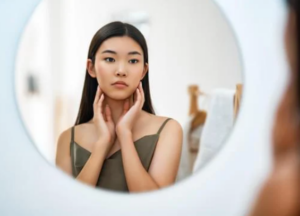Written By: Jennilyn Harvey, LPC
Clinical Assessor at The Renfrew Center of Philadelphia-Spring Lane
 Negative body image is a common issue many people experience throughout various stages in their lives and affects people of all ages, gender, race, abilities, etc. It involves feeling dissatisfied with one’s body and appearance. Negative body image is especially prevalent in individuals suffering from an eating disorder and is often a contributing factor to an eating disorder’s onset and can even be a maintaining factor. In this article, we focus on negative body image and share four root causes of negative body image.
Negative body image is a common issue many people experience throughout various stages in their lives and affects people of all ages, gender, race, abilities, etc. It involves feeling dissatisfied with one’s body and appearance. Negative body image is especially prevalent in individuals suffering from an eating disorder and is often a contributing factor to an eating disorder’s onset and can even be a maintaining factor. In this article, we focus on negative body image and share four root causes of negative body image.
What Is Body Image?
What is body image? Body image refers to how a person sees their body and their feelings towards the perception of their body. Body image may ebb and flow between positive and negative thoughts and feelings. How a person feels about their body may change depending on what circumstances are going on around them as well as internally and emotionally. Body image may even change throughout the day.
4 Root Causes of Negative Body Image
Throughout the eating disorder treatment and recovery process, it is helpful to understand the root causes of negative body image to help neutralize and separate from body image thoughts to reduce eating disorder symptoms and behaviors.
#1: Family Emphasis on Appearance and Food
Establishing one’s perception of appearance and food often begins within an individual’s family. Growing up, you may have observed an emphasis on appearance over other qualities. You may feel more negatively about your body if your physical appearance doesn’t match the standards of appearance as defined by your family. You may feel like you don’t fit in, are accepted, or loved unless your body looks a certain way. In addition, an individual’s family may have also placed an emphasis on food and what is deemed appropriate in terms of eating habits. A person who grew up in a family that focused on labeling foods as “good” vs. “bad” or “healthy” vs. “unhealthy” may struggle with their relationship with food as well as their body. We may shame ourselves for eating foods considered to be “bad” and praise ourselves for eating foods our family labeled as “good” leading to a belief that our bodies are either “good” or “bad” based on what we eat.
#2: Bullying/Teasing
Many people who experience perpetual negative body image thoughts have experienced some type of teasing or bullying about their physical appearance. School-age students are at a higher risk for this type of negative experience. When someone has been bullied or teased about their weight or appearance, whether through name-calling, unwanted comments, spreading rumors, or leaving someone out of an event, it can have a devastating impact on their body image and overall self-esteem.
#3: Social Media Influence
Social media is one of the main contributors of negative body image, particularly during the adolescent and teenage years. Social media has the propensity to become harmful and damaging to a person’s view of themselves for a number of reasons. Editing and filters are almost undetectable, which causes people to believe that the image they are looking at is a real and authentic version of the image. It is incredibly easy to manipulate the size and shape of someone’s body and appearance on social media. Viewing these images, and often, may result in lower body satisfaction and body image because of comparison. An individual may believe they aren’t good enough because they don’t have the same traits, appearance, or body shape as others on social media.
#4: Cultural Influence
Cultural factors may also contribute to negative body image and body dissatisfaction. Cultural expectations may shape our ideas about beauty standards and what is acceptable in terms of our appearance. These standards can influence the way we perceive our bodies and the value we place on our appearance. These standards and norms may be associated with how successful an individual is as well. Not meeting these standards may potentially contribute to negative body image. Diet culture promotes and idealizes thin bodies which can directly influence someone’s view of their body in comparison.
Final Thoughts
Poor or negative body image can largely impact a person’s overall physical and mental health. It is important to understand how body image is formed as well as some of the root causes that contribute to an overall negative body image, especially for those who struggle with an eating disorder. Challenging negative body image can be a slow process but can also lead to a sense of empowerment, self-acceptance, and can help develop a sense of appreciation for all the things your body can do separate from one’s appearance.



